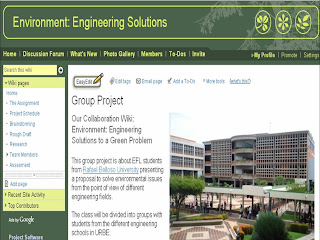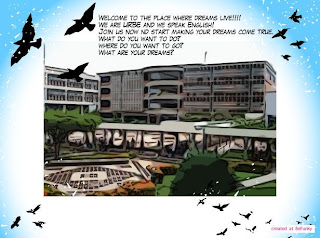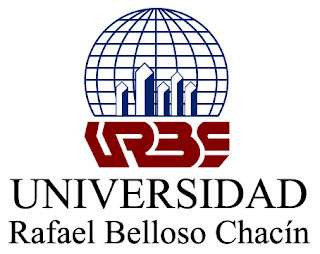 Unit 3. Finding a job on line
Unit 3. Finding a job on line
Well, now you're about to graduate... and comes the hard task of finding a job... So, where do we start? A good way to find a job is by looking for the perfect job in the internet. Let's get ready to ship off in this exciting adventure!
Finding a Job!
First of all... ask yourself this question: What do you want to do? What can you do? What are you certified or will be certified ...soon... to do?
Next, go to
Yahoo Hot Jobs ,
Monster.com or
Vault and try to located a job you'd like to have. This is how your degree is called in the United States or these are your
Certifications.
Now, that you have selected a job, apply on line and check on vocabulary.
This is a useful article about how to find an online job
When it comes to a fruitful online job search, successful job seekers follow these 10 guidelines.
1. If you build it, they can come. Instead of simply posting your resume on a Web site, take it one step further and design an easily-navigable Web site or online portfolio where recruiters can view your body of work, read about your goals and obtain contact information.
2. Check yourself to make sure you haven't wrecked yourself. Google yourself to see what comes up -- and what potential employers will see if they do the same. If you don't like what you find, it's time to do damage control.
3. Narrow your options. Many job boards offer filters to help users refine their search results more quickly. You should have the option to narrow your job search by region, industry and duration, and, oftentimes, you can narrow it even more by keywords, company names, experience needed and salary.
4. Go directly to the source. Instead of just applying for the posted job opening, one of the best strategies to finding a job is to first figure out where you want to work, target that company or industry and then contact the hiring manager. Also, many employers' career pages invite visitors to fill out candidate profiles, describing their background, jobs of interest, salary requirements and other preferences.
5. Find your niche with industry Web sites. Refine your search even more by visiting your industry's national or regional Web site, where you can find jobs in your field that might not appear on a national job board. More and more employers are advertising jobs on these sites in hopes of getting a bigger pool of qualified applicants.
6. Try online recruiters. Recruiters will help match you with jobs that meet your specific skills and needs. Not sure where to start? Sites such as recruiterlink.com, onlinerecruitersdirectory.com, searchfirm.com and i-recruit.com provide links to online headhunters for job seekers.
7. Utilize video resumes. Video resumes are just one more way to stand out to employers. Intended as supplements to -- not replacements for -- traditional resumes, video resumes allow job seekers to showcase a little bit of their personalities and highlight one or two points of interest on their resumes.
8. Run queries. You run searches on everything else, from your high school sweetheart to low-fat recipes, so why not jobs? Enter a query that describes the exact kind of job you're seeking and you may find more resources you wouldn't find otherwise (but be prepared to do some sorting).
9. Utilize job alerts. Most job boards have features that allow you to sign up to receive e-mail alerts about newly available jobs that match your chosen criteria. Or go a step further and arrange an RSS (really simple syndication) feed from one of these job sites to appear on your customized Internet homepage or your PC's news-reader software.
10. Get connected. How many times have you been told that it's not what you know, but who you know? Thanks to the emergence of professional networking sites like LinkedIn.com, job seekers no longer have to rely on the old standby of exchanging business cards with strangers. These sites are composed of millions of industry professionals and allow you to connect with people you know and the people they know and so forth. (A word of caution: When you sign up for online social networking sites, you are in a public domain. Unless you are able to put a filter on some of your information, nothing is private, and it can be difficult to erase once it is posted.)
Copyright 2007 CareerBuilder.com.
Here, there's a nice video with some other tips on how to find a job on line..
How to Find a Job Online —powered by eHow.com
This is the transcript
Hi! My name is Tine Buechler from Business Growth Training and I am here today on behalf of Expert Village.com. I want to talk about in this clip the electronic component of job search. I haven’t talked about this so far. When you are looking for work, more and more job postings are available on line. You can e-mail resumes. All of that is becoming more and more common. There are some tips though that would make you be more successful in this process and there are some traps to be careful about.
Number 1 if you are going to attach your resume and you are going to be e-mailing it and attaching it, make sure that your title you have given to that document is respectful. Resume “Number 17” is not a good title for a resume. As the employer opens it and they will see resume 17, what kind of positive impact will that have. So the best way to do is to name your resume by your last name, your first name and identify it as your resume like your cover letter; last name, first name and cover letter or if you want to shorten it CL. Your references as well; your last name first, first name and indicate that they are references. Any documents that you are sending make sure that they are labeled by your name so that the employer is not getting any information that you don’t want them to get. The second thing you need to consider is what format you are using. When e-mailing by word to another computer and opened by another version of word, could actually change the whole formatting. Make sure you use the basic font. If you want to be sending your resume by e-mail, Times New Roman or Ariel is the two best fonts to use. They are the ones that have the least difficulty when changing from different programs and when changing from different versions of different programs. They maintain their integrity which is very important because I have seen some resumes come through that I can’t read. They’ve all ended up to be little boxes and things because people have chosen a font that my computer doesn’t recognize and doesn’t read. The next thing if you can at all, I would PDF your resume. Really get it into a picture format rather than something that people can doctor. That way no matter who you send it to when they open your resume, it will still maintain a good format and it can’t be changed. The integrity of your documents stays the same. When you are copying and pasting your resume into an electronic application again, use a font of Times New Roman or Ariel. Those are the ones that transfer best over the web. Be careful when you are doing an electronic job search just because it didn’t bounce back doesn’t mean it didn’t arrive safely. Make sure that in your subject line you have the information that you need in the subject line so that the information can be received. Always follow-up an electronic application with a phone call to ensure that it has been received. If you choose to use this method of application and it is very successful, it can be very successful as long as you apply the principals accurately.
Read more: How to Find a Job Online
eHow.co.uk
http://www.ehow.co.uk/video_2200284_find-job-online.html#ixzz1O2CZcbQv
Homework:
1. Find two jobs: a job for an entry level graphic designer (no experience or a little experience), and the job of your dreams. Post your jobs at your blog. Please, write an introductory paragraph explaining why you selected those specific jobs (experience, salary, preferences). Include the link to the job.
Here... check this site for
10 Great Places to Find Graphic Design Jobs
2. Who is a person in your field you look up to? Tell about him or her in your blog.
3. Read the article
Top 10 Online Job Search Tips. Write a comment about it.
Well, that's all for finding a job. Don't forget to post all your work in your blog.
Keep on shining Love and Peace!
.....................................................................................................................................................................
Photo by losmininos
Article taken from: Top 10 Online Job Search Tips
By MARY LORENZ, CAREERBUILDER.COM WRITER
 EnergyVille is an interactive game that puts you in charge of meeting the energy needs of a city or around 3.9 million people.
EnergyVille is an interactive game that puts you in charge of meeting the energy needs of a city or around 3.9 million people.
















